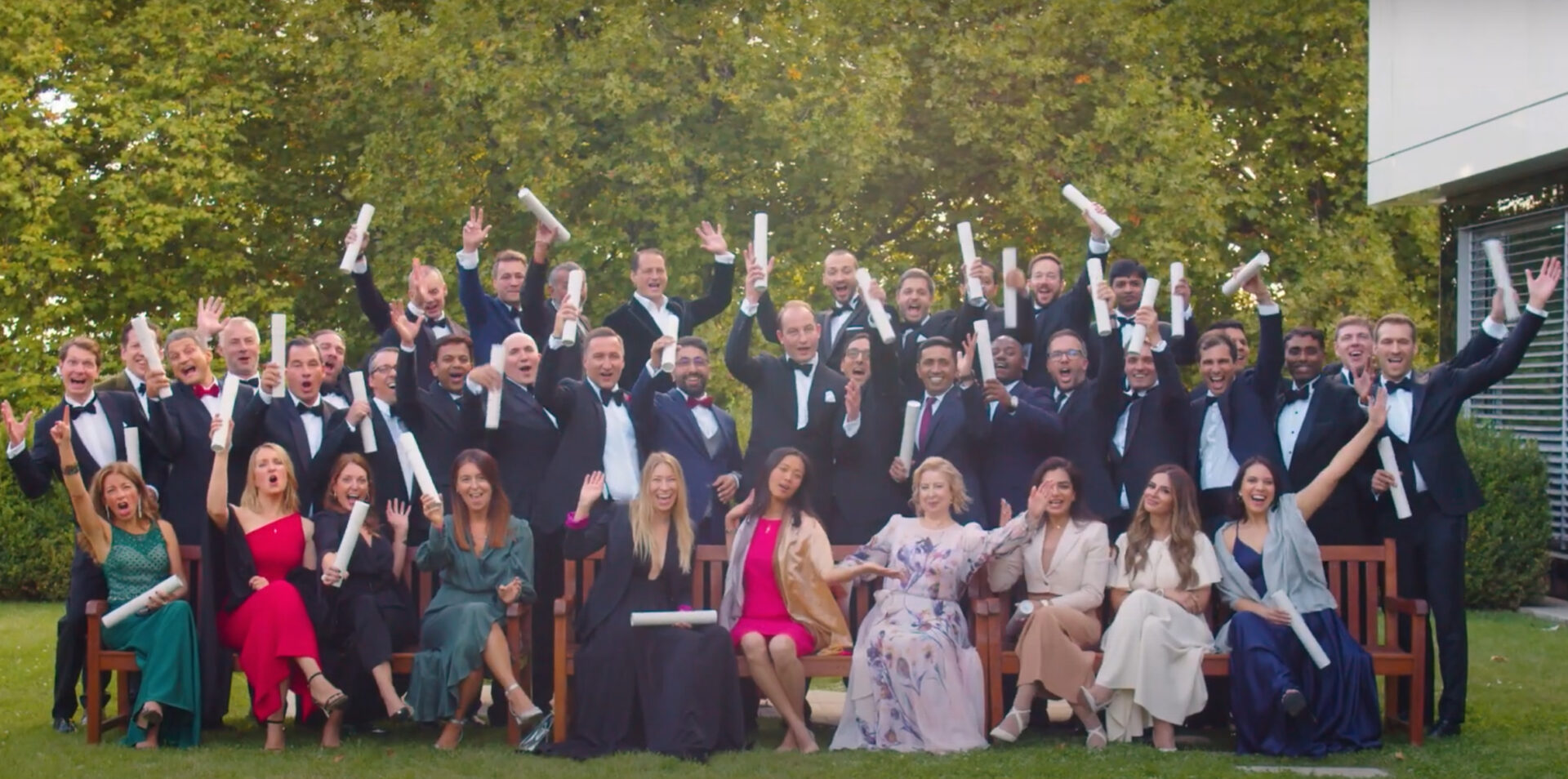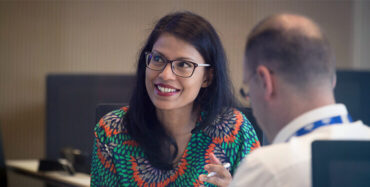Claus Hemmingsen, now serving as chairperson on the boards of DFDS, Innargi and Maersk Drilling, said that did not just mean focusing on meeting the evolving expectations of regulators or investors, but taking on positive stewardship roles as leaders of organizations.
“ESG is here to stay – I really implore everybody to engage,” he said. “It is coming back to hit us, not only reporting, but we need to take responsibility for the impact on the world, and we need to make sure we make the world a better place.”
It was vital, he said, to create more diverse companies and leadership teams, not just to reshape a fairer society, but to harness the improved performance that well-managed diversity can bring.
“I am happy to see a diverse group here today,” he said of the EMBA class, featuring graduating participants from a wide range of nations such as Peru, the Democratic Republic of the Congo, Saudi Arabia, India and Bulgaria. “Diversity means a lot. Diverse teams, not only gender, are just creating so much better outcomes. It is a career-long learning that diverse teams are more effective.”
Central to leading organizations through the complex transformations needed to deliver positive change was to be “mindful of the society around you” and to build genuine relationships with external stakeholders in the good times, not just when crises or sudden needs arise.
“When you come too late, nobody wants to listen,” the 2007 EMBA class valedictorian warned.
Hemmingsen’s inspiring call to action was echoed by the September 2022 cohort’s valedictorian, Urs Waelchli, who, in a colorful and entertaining address, reminded his program peers of the meaning of the second half of IMD’s tagline: real learning, real impact.
“Real impact – this is our task as we complete our degree here,” Waelchli said. “There is no value in the paper you receive today based on what you did in the last months here at IMD, if we don’t go on and deliver real impact. The value lies in what you do with it … This world needs us more than ever. We know that we can deliver results despite difficult situations.”
Take risks, be authentic and delegate with empowerment
Drawing on lessons from decades of varied experience in leadership roles at Maersk, Hemmingsen encouraged the 41 graduates to embrace authenticity to motivate teams, while never turning down a good offer of a fresh challenge to keep on growing on an individual level.
“If you want to progress, you have to do something dangerous,” he said, explaining that he had jumped from operations to sales and then shipping to oil and gas in “career-defining” moments.
He said leaders had to be authentic to take people with them, especially in challenging circumstances such as transformations.
“You cannot always be nice, but you must always be authentic – people must feel you,” he explained. “Leadership requires followers, and the most effective, productive, loyal and dedicated followers are those that are motivated, inspired and drawn to their leaders. Followers of today, more than ever need to be motivated by a purpose, a cause and by having a positive impact.”
Leadership also had to be “a team effort” with shared responsibilities, he said. “You need to delegate, but you need to delegate with empowerment.”
Gratitude, generosity and balance
In his congratulatory remarks, IMD President and Nestlé Professor Jean-François Manzoni urged the class to “develop a strong gratitude practice”, to be generous, and to strike a balance between working hard to find success and borrowing against other facets of life.
“Force yourself, regularly once a day or once a week to identify elements in your life for what you want to feel grateful,” President Manzoni said.
Citing research by organizational psychologist and author Adam Grant, Manzoni explained that “givers do better than takers”.
“Maybe not ‘pathological givers’ because ‘pathological givers’ get taken advantage of, but ‘smart givers’ do get ahead over time,” he said, adding that generous people tend to have more luck and live longer and healthier lives.
Manzoni said the EMBA cohort would need to invest a great deal of time and energy to come out on top in the competition to succeed in their professional lives, but this would not come without its costs.
“It will be very tempting to borrow this time and energy from the other facets of your life,” he said. “If you borrow from these activities for long enough, they will start disappearing from your radar screen … Whatever you borrow, you have to pay back some time, and one day you will get the check.”
He suggested EMBA graduates should create a balanced scorecard, with objectives for every important part of their lives, and to actively manage that balance. “Do borrow from the future and other facets of your life, but do so very deliberately,” he said.
Dean of the EMBA program Professor Stefan Michel advised his class, as they move on to their next adventure, to “look at the familiar, the well-known, the routines with a fresh set of eyes”.
“Pretend that you don’t know,” Professor Michel said, borrowing from Hemmingsen’s leadership insight to feign ignorance, even if you know it all. “Experience each moment for the first time,” he added.
Paraphrasing ancient Greek philosopher Heraclitus, he concluded: “No woman ever steps in the same river twice, for it’s not the same river, and she is not the same woman.”

